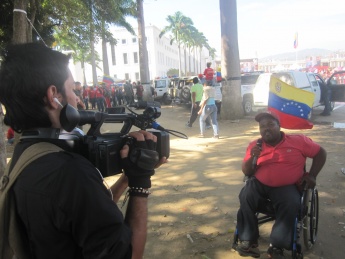Disabled people have always positioned themselves at the forefront of the Bolivarian project in Venezuela, but their role is often understated.
I took a trip to the Metropolitan Council of Popular Power for People with Disabilities, an independent organisation campaigning for the rights people with disabilities, and spoke to Luis Roja. It appeared that he was one of the leading figures of the Council, but he tells me that he is “just another one,” gesturing towards the many people who come and go as our conversation develops. Luis spoke to me as a passionate supporter of the political process taking place in his country, but was adamant that more needs to be done.
“Por ahora [a ninety-second, televised speech made by Hugo Chavez immediately following the failure of his attempted coup in 1992, which propelled him into the public eye for the first time] for us, was an awakening. Chavez was saying that people needed to organise, and so we organised ourselves. The governments of the Fourth Republic [those that came before Chavez’ first electoral victory in 1998] had a badly-named law, the law for in-capacitated people; just with that law they assassinated our rights as disabled people, as if we weren’t supposed to leave our houses. I believe that the por ahora was an internal revolution for people with disabilities.”
“We have this organisation, but disabled people need to be given much more of a voice. What we are asking Maduro for is a new government ministry to be created for people with disabilities.”
Ramon, a blind man who I meet as he walks along the street near Plaza Bolivar, agrees with Luis’ sentiments. “We need disabled people in the National Assembly, disabled people in the regional governments, disabled people speaking on every platform, because we are the people who know how to solve the problems that we face!”
It is all too easy to take the small privileges in life for granted. For people with certain physical disabilities, for example, a wheelchair can be an essential item. You can try to imagine having no way of getting from A to B, but unless you have been in such a situation, you will not be able to imagine. The first few times I met Ofel, a young man selling telephone calls, sweets and cigarettes in the centre of Caracas, I assumed he had always used a wheelchair. In fact, he told me, now aged 30, he received one from the government just two years ago.
“Before that, I never had one! I got one from Mision Jose Gregorio Hernandez [a government program set-up in 2008 to help people with disabilities], and thanks to that, now I am able to work, to get around … before I couldn’t even leave my house.”
Opposition supporters say that the government “missions,” designed at helping to alleviate problems for disadvantaged sections of society, are inefficient and need to end. At an opposition stall in Parque Central, I speak to Mrs. Ferreira, who has lived in Caracas for the last thirty years.
“The problem is, if you just gift people things, they don’t know how to take care of it, because they didn’t have to pay anything!”
Despite his supporters views on the missions, opposition candidate Henrique Capriles, who will come head-to-head with Nicolas Maduro in Presidential elections on Sunday, has been promising to keep them in place. His claims have failed to resonate with many voters who have benefited from them, and who believe that with the opposition in power they would never have existed in the first place.
“If Capriles wins,” Ofel tells me without hesitation, “the missions will be gone. The benefits for disabled people … out!”
It is a commonly-held sentiment amongst supporters of the Bolivarian process. In a speech in the state of Nueva Esparta this week, Nicolas Maduro warned against the dangers of “triumphalism”, whilst recognising the near-certainty of his victory in upcoming elections.
However, for people who have lived without wheelchairs, homes, medical care and education, the choice they have to make on Sunday is a very real one. Maybe some citizens here believe that things “handed out for free” will not be appreciated by those who receive them, but if I got my first wheelchair at the age of twenty-eight, looking after it would certainly be a priority.
Jody McIntyre is a journalist, author and political activist. He has written for the the New Internationalist, The Independent, The Guardian, The Observer, Al Akhbar English, the New Statesman, Electronic Intifada and Disability Now. He was Guest Editor for the October 2012 issue of the New Internationalist. He is also the co-director of a forthcoming documentary on the Venezuelan ‘Hip-Hop Revolucion’ movement with Pablo Navarrete. For updates, please follow @JodyMcIntyre.
Photo: Ewan Robertson / Venezuelanalysis.com



